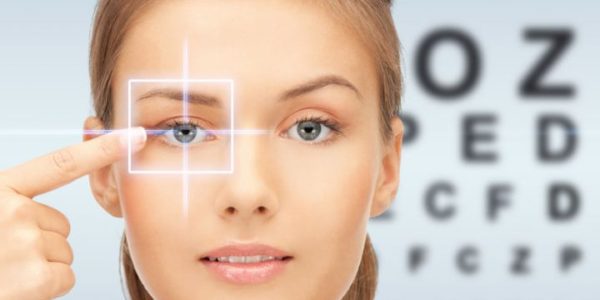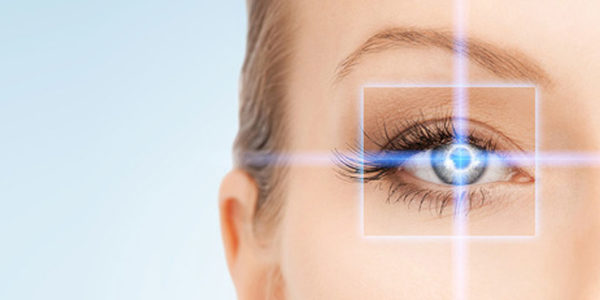- Myopia :
- Farsightedness :
- Astigmatism
- What is the LASIK vision correction process?
- People who benefit from LASIK vision correction: How can I prepare for LASIK vision correction?
- Precautions before LASIK vision correction:
- Phases of the laser vision correction process:
- What are the risks of vision correction surgery LASIK vision correction?
- Risks of LASIK vision correction during surgery:
- What should the patient do after LASIK vision correction?
Vision defects range from nearsightedness, farsightedness, astigmatism, and nearsightedness.
Myopia :

Myopia is the ability to see near objects clearly and the inability to see distant objects with sufficient accuracy, and the distant image is always blurry and requires double effort to see it with sufficient clarity. This makes the eye in a state of constant stress and the patient suffers from chronic headaches and fatigue. This defect usually appears in the pre-adolescent age and may worsen during adolescence.
The diagnosis is made when the patient notices that he needs to bring the book or mobile closer to his eyes to see them clearly, and for example, he needs to sit on the front seats in the classroom to see the blackboard clearly. And myopia directly affects his academic achievement. It is necessary to visit the ophthalmologist at this stage to do a medical examination of the eye and then determine the extent of the patient’s vision and advise him to wear medical glasses or contact lenses until he reaches the age of eighteen.
Hypermetropie
Farsightedness is the opposite of nearsightedness in which a person is able to see distant objects clearly and not see nearby objects with sufficient clarity. Which may affect daily life and the patient suffers while reading and writing, for example. Of course, he also suffers from chronic headaches and constant stress. With the medical examination and eye examination, the ophthalmologist determines the extent of long-sightedness and the patient’s need for glasses or contact lenses.
Astigmatism
Astigmatism, also known as astigmatism, in which the patient sees all objects in a blurry and distorted manner and lacks the required accuracy. And it is the result of uneven curvature of the cornea, and then the reflected rays inside the eye are focused on different parts and points within the retina, which makes the image shaky and distorted.
The diagnosis is always through an eye examination with your ophthalmologist, and the glasses and contact lenses are relied on as usual, which causes the patient severe discomfort.
Wearing eyeglasses or medical contact lenses on a daily and permanent basis causes severe discomfort to the patient But with laser vision correction operations, he can dispense with glasses forever and see life without a reflector or barrier.
What is the LASIK vision correction process?

The laser is used to correct vision semi-permanently and completely get rid of eyeglasses and contact lenses. The laser is one of the latest technologies in the treatment of vision defects that have revolutionized the field of ophthalmology, as the technology used depends on the use of (laser) to change the shape of the cornea, which allows the fall of The image is on the retina, not behind it.
People who benefit from LASIK vision correction:
What is new in laser vision correction surgeries is that it makes people who wear glasses and contact lenses on a regular basis indispensable and provides them with a safe alternative to correcting their vision.
How can I prepare for LASIK vision correction?
There are procedures that the patient must follow before performing the laser vision correction operation to ensure the success of the operation and without any side effects:
- Meeting with the consultant who examines the patient to ensure his ability to undergo the operation.
- The ophthalmologist examines the eye comprehensively, and the examination includes: Eye field examination. Measure the pressure inside the eye, to avoid the formation of glaucoma in the eye Visual acuity check. Fundus examination.
Precautions before LASIK vision correction:
- The doctor should be informed of any medications the patient is taking prior to surgery.
- Before the operation, you should stop wearing soft (for several days), hard (several weeks) or photosensitive (two to four) contact lenses.
- Stop using make-up, creams and all kinds of cosmetics a few days before the operation.
Phases of the laser vision correction process:
- The LASIK device is adjusted according to your eyesight standards.
- The local anesthetic is instilled into the eye.
- A special tool is used to separate the eyelids and prevent them from twitching, which is painless.
- You will be asked to look at a glowing red light and keep your eye on it.
- The process takes just a few seconds.
- You will not feel any pain during the surgery
Risks of LASIK vision correction during surgery:
Although these side effects are rare, but as any medical procedure can occur, in order to maintain our credibility, we must inform you of them:
- eye irritation
- Blurred vision, which occurs in the first hours after LASIK operations, but disappears after a few hours.
- Night glare, may appear but disappear after the healing of the cornea is complete.
- Sensitivity to light, may appear but disappear within hours and this is avoided by wearing sunglasses.
What should the patient do after LASIK vision correction?
After the operation is completed, the patient goes home, and it is good to sleep for several hours. There is nothing to prevent the patient from going to work the next day and driving the car during daylight hours.
It is not recommended to drive the car at night during the first weeks after the operation, due to a phenomenon called light sensitivity. Your doctor may advise you to use antibiotic drops to prevent eye infection.
In most cases, eye pain does not occur, and if it occurs, painkillers can be taken In the end, it should be noted that the vision will improve immediately after the operation, and that improvement reaches its maximum limits within weeks, however, the doctor may advise you to wear glasses for several weeks until you adapt to the new situation.








